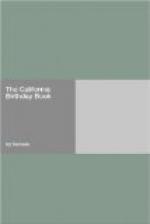Sing of my lover and tell me my fate,
Will he guard me as fondly as thou dost
thy mate?
Dear oriole, sing, while I listen to thee—
When will my true love come riding to
me?
CHARLES KEELER,
in Overland Monthly.
SEPTEMBER 11.
LOOKING BACKWARD!
My heart aches, and a poignant yearning
pains
My pulse, as though from revel I had waked
To find sore disenchantment.
Oh for the simple ways of childhood,
And its joys!
Why have I grown so cold and cynical?
My life seems out of tune;
Its notes harsh and discordant;
The crowded thoroughfare doth fret me
And make lonely.
Darkling I muse and yearn
For those glad days of yore,
When my part chorded too,
And I, a merry, trustful boy,
Found consonance in every friend without
annoy.
Since then, how changed!
Strained are the strings of friendship;
fled the joys;
Seeming the show.
An alien I, unlike, alone!
And yet my mother! The welcome word
o’erflows the eye,
And makes the very memory weep.
No, love is not extinct—that
sweetest name—
The covering ashes keep alive the flame.
MALCOLM McLEOD,
in Culture Simplicity.
SEPTEMBER 12.
The overgoing sun shines upon no region, of equal extent, which offers so many and such varied inducements to men in search of homes and health, as does the region which is entitled to the appellation of “Semi-Tropical California.”
BEN C. TRUMAN, in Semi-Tropical California.
SEPTEMBER 13.
THE CRESTED JAY.
The jay is a jovial bird—heigh-ho!
He chatters all
day
In a frolicsome
way
With the murmuring breezes that blow—heigh-ho!
Hear him noisily
call
From a redwood
tree tall
To his mate in the opposite tree—heigh-ho!
Saying: “How
do you do?”
As his top-knot
of blue
Is raised as polite as can be—heigh-ho!
O impudent jay,
With your plumage
so gay,
And your manners so jaunty and free—heigh-ho!
How little you
guessed
When you robbed
the wren’s nest,
That any stray fellow would see—heigh-ho!
CHARLES KEELER,
in Elfin Songs of Sunland.
SEPTEMBER 14.
It is to prevent the wholesale slaughter of songbirds that I appeal to you. The farmer or the fruit-raiser has not yet learned enough to distinguish friend from foe, and goes gunning in season and out of season, so that the cherry orchard, when the cherries are ripe, looks like a battle-field in miniature, the life-blood of the little slain birds rivaling in color the brightness of their wings and breast. And all this destruction of song, of gladness, of helpfulness, because the poor birds have pecked at a few early cherries, worthless, almost, in the market, as compared to the later, better kinds, which they do not interfere with.




